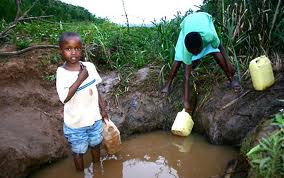The economics of water is as clear as water itself, the fountains and streams and oceans are so abundantly deceptive, almost a make believe that water is too available to become an economic benefit. But what about the thirsty populations of sub Saharan Africa that has remained thirsty despite the abundance of water. The perception that what is abundant and can’t be an economic tool for development is absurd and should be discarded if development were to come to the shores of Africa. Africa must begin to appreciate water and pay for it.
Free is the wrong price for water. In fact, the lack of a price for water services is the most important thing wrong with this resource. When a resource is abundant it does not necessarily mean it’s free and can be wasted and abused.
These obviously are the reasons for the non availability of water in Africa. Societies that can properly conserve water and harness it for public consumption develop and take care of basic challenges such that diseases like [malaria, dysentery, cholera, skin irritations and diarrhorea]would have been taken care of without it arising anymore.
The United Kingdom and the USA can confidently say that some of the primary health challenges have been taken care of, and it’s almost alien to talk about some diseases in these countries. In Philadelphia (USA) there are 3,300 miles of water mains and the water department ensures the rehabilitation or replacement of 20 miles of main in a year. This is one of the reasons you hardly have primary challenges in this areas. However apart from the positive impact on health, it boost to the economy can’t be overemphasized. America invests hugely in safe drinking water and it’s glaring after a survey by the world health organization that for every dollar invested, the returns is about three to thirty four dollars depending on the region and technology. Every US dollar invested in water and sanitation provides an economic return of eight dollars.
African nations should thereby take deliberate efforts in planning for water, it’s imperative to state here that the increasing population of the continent has not been prepared for by the various leaders of this continent. Some area doesn’t even have a plan for networking water to its populace. If water is to be beneficial to its citizens and to economy of any state it must be taken from its pure natural state and channeled to a basin. A standard and globally accepted method of purification must put in place to purify and make fit for drinking, one process that is also key is to make sure it gets to the end user and that involves deliberate mappings, topographies of landscapes and a lot of scientific works. This is big economic business and can engage a teaming population from professionals to even artisans. The management of water also must include imposing a tiered pricing system, imposing conversation measures, requiring greater industrial efficiency that may require the reclaiming and reuse of waste water or expanding underground water storage as an alternative to expanding surface water storage. The world must prepare for its increasing populations and plan ahead for it. Nothing happens by chance and every developmental process is deliberate, Africa must see beyond just a free gift of nature and start to generate financial resource from natural resource. This continent can get better if the business of water is taken seriously.
Oluwaseun Idowu is a Nigerian who is passionate about Africa. He believes that if Africa harnesses all its potentials it could be the most sought after economy. He is @alphaIdowu on Twitter

